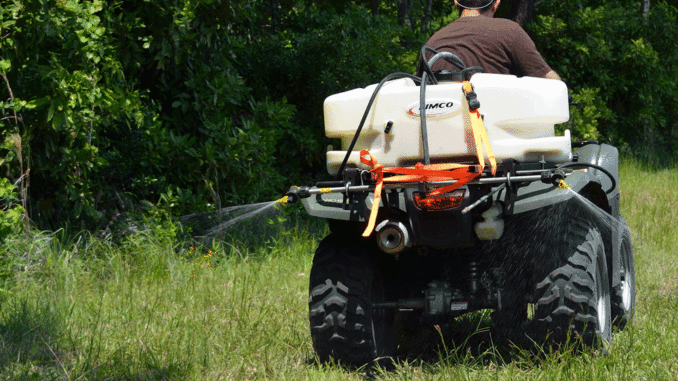
Preparation for any seasonal planting should start several months before covering the first seed with soil. Beginning with soil tests and lime treatments, many tasks are required to prepare a site for a productive, cool-season food plot. With the planting season just around the corner, future headaches can be remedied with pre-plant burn down.
Most clearings destined for fall plots in August are dominated by 47 different species of broadleaf plants, grasses and pesky woody shrubs. These pioneer species will invade open spaces and establish themselves in a hurry. Pre-plant burn down will help control competition prior to planting fall plots.
While plowing will uproot many problematic pests, nothing replaces a heavy dose of a broad-spectrum systematic herbicide, such as glyphosate (Round-Up).
Plowing alone will uncover and then recover the root masses of many of the grasses and broadleaf species intended to kill. While these fields can be plowed multiple times to suppress unwanted growth, plowing releases critical soil moisture, especially during periods of drought or on excessively well-drained sites. Plants must have adequate moisture to grow. Plowing should only be conducted before planting to bank as much soil moisture as possible in dry-prone sites.
Weeds and grasses can be a problem, even in cool-season food plots. Herbicides kill these nutrient hogs immediately, preventing re-sprouting. Glyphosate will also kill shrubs and saplings by using a high-rate application.
Glyphosate attacks plants through the foliage and is not soil active; therefore, future plantings will not be affected. Every herbicide intended to enter through the foliage should always be applied with a surfactant. While surfactants and adjuvants are fancy names for crop oil, they are critical to allow the chemical to stick to the targeted plants under many conditions. With many surfactants on the market, Helena Chemical has perfected a surfactant called “Induce” with an excellent sticking quality and is highly resistant to evaporation during hot and dry conditions.
Luckily, Induce is concentrated, and one 2 ½-gallon container will last many applications.




Be the first to comment